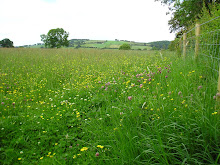

A time for bees to cluster and beekeepers to worry. Our bees were well fed and also able to forage throughout October before being bedded down under some hessian as the temperatures dropped during November. This year there was no useful flow from the Ivy but the Himalayan Balsam (so hated by conservationists) provided valuable late feed.
December brought us nightime temperatures down to -15.9c and two spells of snow that blocked the hive entrances. Each time it thawed a few dead bees were revealed outside each entrance. Initial fears for the bees gave way to the realisation that housekeeper bees had been clearing out the bodies so the colonies were still functioning normally.
Should Mother Nature grant any daytime temps of 8 - 10c we shall apply oxalic acid to kill Varroa mites. This treatment is harmful to open brood so can only be done in the dormant winter season when the Queen is not laying.
The long evenings provide opportunities for reading and planning for the spring. Jennie gave me a little book "The Beecraftsman" by H.J.Wadey then editor of the magazine "Bee Craft". He wrote it in 1943 in quiet periods whilst on night duty with the National Fire Service. Clearly they had a more robust attitude to Health & Safety in those dark days. Despite the fact that he recommends wearing motorcyclists' goggles and says "...Woolworths have them at about 6d" his method of dealing with a swarm in a chimney seems a bit risky even by wartime standards. If a good fire in the grate supplemented with sulphur doesn't smoke them out he says "...If the fire will not draw, extinguish it, close the bottom of the chimney with wet sacks, and pour a couple of gallons of ordinary petrol down from the top, which should then be covered with wet sacks". A plan that would be wrong by today's standards on so many levels! Mind you he also says that "Potassium Cyanide is generally recommended for killing bees but experience with it has not been encouraging". Don't get me wrong, the reader who survives immolation or poisoning will find that its a great little book. I am particularly lucky as my copy has marginal and some typed notes inserted by a previous owner long ago.


No comments:
Post a Comment